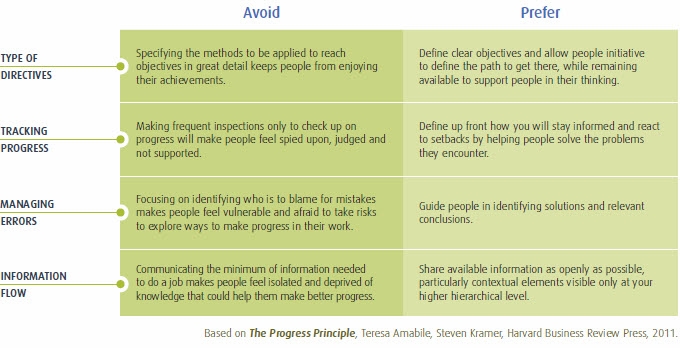Management gemsFind here some gems from our monitoring of the best publications on leadership and management

Create a climate of constructive debate
Feeling supported by an environment that is focused on the best way to attain objectives is highly simulating. Being able to share thinking with colleagues, capitalize on their ideas, freely share opinions on their work, and openly discuss encountered problems are all opportunities to reinforce the enjoyment felt by employees as true stakeholders in an efficient organization. This, in turn, facilitates the self-gratifying accomplishment of their objectives.
Executives and middle managers alike have considerable influence on creating this mindset.
To learn more :
Monitor the progress of work without depriving employees of their autonomy
It is absolutely natural for managers to ensure that people’s work is progressing well. However, the attitude shown by the manager may be stimulating employees' motivation or conversely killing employees’ motivation! In the first instance, supervision is experienced as support in identifying and solving problems. In the second, it is felt to be as an intrusion that dispossesses the employee of his or her responsibilities. Four risks must therefore be carefully avoided to manage the team:

To learn more :
¬ Stimulate job satisfaction (Manageris’ Synopsis No.212a)
Avoid blunders that sap motivation
The main source of motivation at work is the enjoyment people feel when they make progress toward their objectives, provided of course that they value the latter!
This condition is not difficult to fulfill. Indeed, a person need only feel that he or she is making a useful contribution to a relevant goal. But numerous management blunders regularly undermined the sense of accomplishment. Being aware of these pitfalls minimizes the risk of demotivating employees by giving them the feeling that they are not useless.

To learn more :
¬ Stimulate job satisfaction (Manageris’ Synopsis No.212a)
¬ Motivational springboards for your workforce (Manageris’ Synopsis No.156b)
A strategic planning tool: the scenario method
The scenario method does not claim to help predict the future. Rather, the objective is to identify the principal uncertainties that influence market trends in order to prepare effectively for different possibilities. In an increasingly unstable environment, this is a useful complement to the inherently rigid annual budgeting process.

To learn more :
¬ Leader 2.0 (Manageris’ Synopsis No.209a)
¬ Uncertainty and scenarios (Manageris’ Synopsis No.111a)
What is managerial courage?
 Excerpt Manageris’ Synopsis No.136b
Excerpt Manageris’ Synopsis No.136b
If there is one quality that distinguishes great leaders, respected team managers, or even high-potential employees, it is undoubtedly courage. Increasingly uncertainty, the need to make decisions rapidly, often unclear lines of responsibility, contradictory demands from different stakeholders make contradictory demands, etc. : all these constraints impose courage.
Courage must also be expressed every day, at every level in the business world. In fact, it is not enough to simply follow orders from management. The company expects its employees to act with courage in many circumstances.
However, it is not a question of taking unconsidered risks. The authors of "The Courage to Act" have highlighted various domains in which courage is critical to performance.
1. Courage to face the truth and to express it.
Lucidity is one of the first signs of courage. Many people prefer not to admit there is a problem, rather than recognize it and be forced to respond. The lack of courage is therefore often insidious, because it is easier for people to think of themselves as ignorant as cowardly! Furthermore, being aware of a problem is not sufficient if one does not dare to express it. At every company, there are impassioned hallway discussions where people vigorously express what they would have liked to say in a meeting “if they could have.” However, repeated acts of “minor cowardice” can ultimately undermine the performance of a team or a company.
2. Courage to rely on others.
A second form of courage indispensable to companies is daring to rely on others. Everyone knows that efficient delegation is critical to performance. However, the degree of courage to delegate is generally underestimated: you must be ready to relinquish control over results, you control over results, be ready to call into question, share information, etc.. Likewise, collaborate with others inevitably carries an element of risk. Work effectively in teams therefore requires this form of courage.
3. Courage to make decisions in risky or uncertain situations.
Making decisions without being able to weigh the consequences in detail, or to collect all desired information is difficult but essential. Companies need employees able to show initiative, which may sometimes mean daring to take action without receiving prior approval from superiors, for example. Conversely, someone can be courageous in deliberately choosing not to take action despite pressure from shareholders, superiors or employees!
4. Courage to work outside our comfort zone
Top-performing teams are those that dare to move outside the comfort of what they know, and push the limits. Setting ambitious objectives and having the persistence to pursue them in the face of adversity is a particularly critical form of courage in the business world. When confronted with a situation that is relatively satisfying, how many are willing to upset things to continue to improve?
5. Courage to impose rigorous standards.
Finally, a dimension that is often underestimated consists in imposing discipline and rigor on ourselves and others. Clarifying the rules and ensure they are followed is an essential part of the job of team manager or leader. This idea appears to clash with the vision of the glorious leader ready to take risks with its own perils. And yet, imposing discipline does take real courage: it takes a lot of motivation to define obligations whose benefits may not be visible in the short term. And work relentlessly to ensure that these rules are applied, especially since those thus constrained are unlikely to give thanks in return!
For more information :
- Courage, an essential leadership quality (Manageris’ Synopsis No.136b)
- The Courage to Act, Merom Klein, Rod Napier, Davies-Black Publishing,2003.